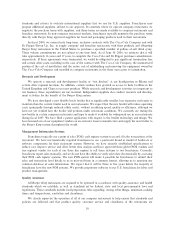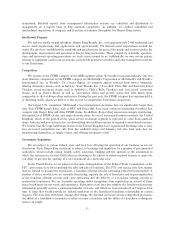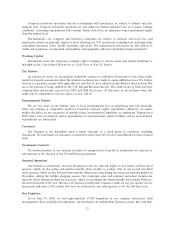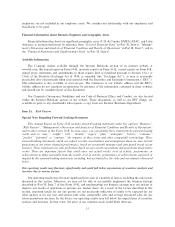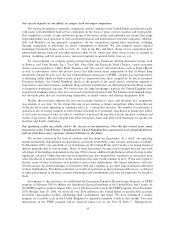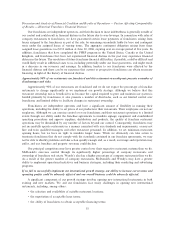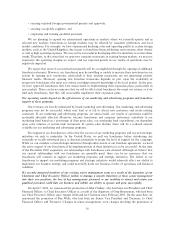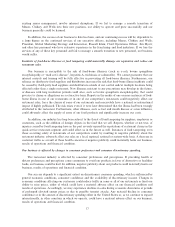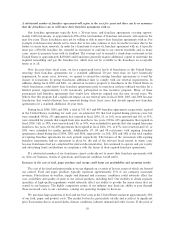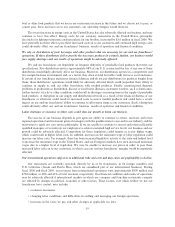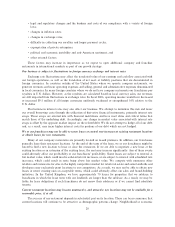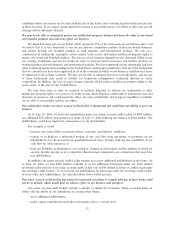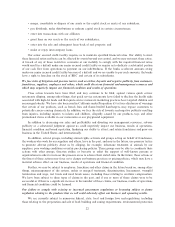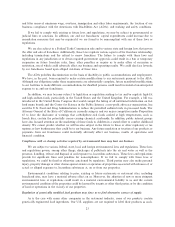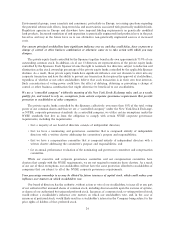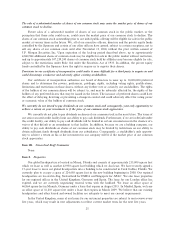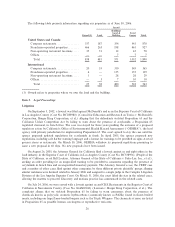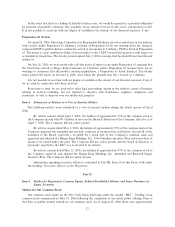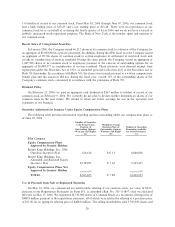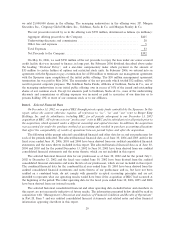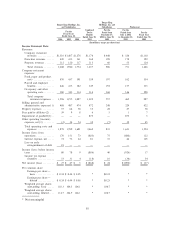Burger King 2006 Annual Report Download - page 32
Download and view the complete annual report
Please find page 32 of the 2006 Burger King annual report below. You can navigate through the pages in the report by either clicking on the pages listed below, or by using the keyword search tool below to find specific information within the annual report.‚ legal and regulatory changes and the burdens and costs of our compliance with a variety of foreign
laws;
‚ changes in inflation rates;
‚ changes in exchange rates;
‚ difficulty in collecting our royalties and longer payment cycles;
‚ expropriation of private enterprises;
‚ political and economic instability and anti-American sentiment; and
‚ other external factors.
These factors may increase in importance as we expect to open additional company and franchise
restaurants in international markets as part of our growth strategy.
Our business is subject to fluctuations in foreign currency exchange and interest rates.
Exchange rate fluctuations may affect the translated value of our earnings and cash flow associated with
our foreign operations, as well as the translation of net asset or liability positions that are denominated in
foreign currencies. In countries outside of the United States where we operate company restaurants, we
generate revenues and incur operating expenses and selling, general and administrative expenses denominated
in local currencies. In many foreign countries where we do not have company restaurants our franchisees pay
royalties in U.S. dollars. However, as the royalties are calculated based on local currency sales, our revenues
are still impacted from fluctuations in exchange rates. In fiscal 2006, operating income would have decreased
or increased $9.5 million if all foreign currencies uniformly weakened or strengthened 10% relative to the
U.S. dollar.
Fluctuations in interest rates may also affect our business. We attempt to minimize this risk and lower
our overall borrowing costs through the utilization of derivative financial instruments, primarily interest rate
swaps. These swaps are entered into with financial institutions and have reset dates and critical terms that
match those of the underlying debt. Accordingly, any change in market value associated with interest rate
swaps is offset by the opposite market impact on the related debt. We do not attempt to hedge all of our debt
and, as a result, may incur higher interest costs for portions of our debt which are not hedged.
We or our franchisees may not be able to renew leases or control rent increases at existing restaurant locations
or obtain leases for new restaurants.
Many of our company restaurants are presently located on leased premises. In addition, our franchisees
generally lease their restaurant locations. At the end of the term of the lease, we or our franchisees might be
forced to find a new location to lease or close the restaurant. If we are able to negotiate a new lease at the
existing location or an extension of the existing lease, the rent may increase significantly. Any of these events
could adversely affect our profitability or our franchisees' profitability. Some leases are subject to renewal at
fair market value, which could involve substantial rent increases, or are subject to renewal with scheduled rent
increases, which could result in rents being above fair market value. We compete with numerous other
retailers and restaurants for sites in the highly competitive market for retail real estate and some landlords and
developers may exclusively grant locations to our competitors. As a result, we may not be able to obtain new
leases or renew existing ones on acceptable terms, which could adversely affect our sales and brand-building
initiatives. In the United Kingdom, we have approximately 70 leases for properties that we sublease to
franchisees in which the lease term with our landlords are longer than the sublease. As a result, we may be
liable for lease obligations if such franchisees do not renew their subleases or if we cannot find substitute
tenants.
Current restaurant locations may become unattractive, and attractive new locations may not be available for a
reasonable price, if at all.
The success of any restaurant depends in substantial part on its location. There can be no assurance that
current locations will continue to be attractive as demographic patterns change. Neighborhood or economic
20


